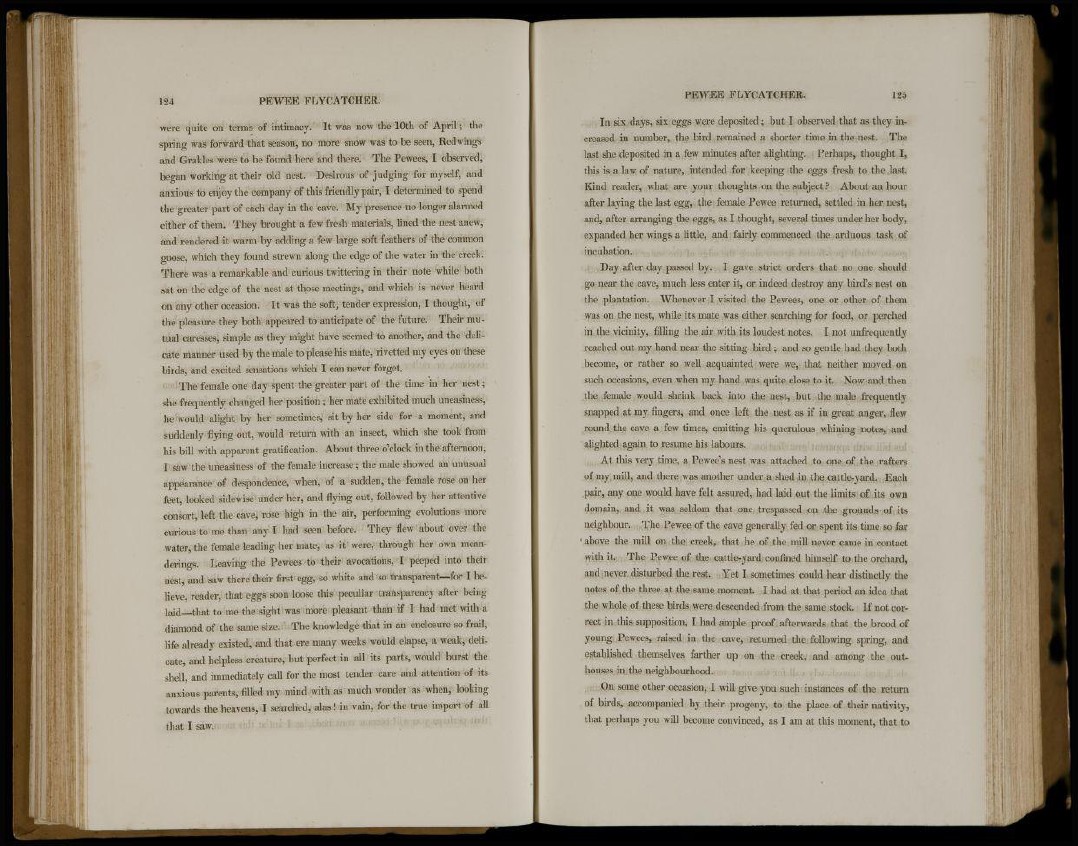
1 2 4 P E W E E FLYCATCHER.
were quite on terms of intimacy. It was now the 10th of April; the
spring was forward that season, no more snow was to be seen, Redwings
and Grakles were to be found here and there. The Pewees, I observed,
began working at their old nest. Desirous of judging for myself, and
anxious to enjoy the company of this friendly pair, I determined to spend
the greater part of each day in the cave. My presence no longer alarmed
either of them. They brought a few fresh materials, lined the nest anew,
and rendered it warm by adding a few large soft feathers of the common
goose, which they found strewn along the edge of the water in the creek.
There was a remarkable and curious twittering in their note while both
sat on the edge of the nest at those meetings, and which is never heard
on any other occasion. It Avas the soft, tender expression, I thought, of
the pleasure they both appeared to anticipate of the future. Their mutual
caresses, simple as they might have seemed to another, and the delicate
manner used by the male to please his mate, rivetted my eyes on these
birds, and excited sensations which I can never forget.
The female one day spent the greater part of the time in her nest;
she frequently changed her position ; her mate exhibited much uneasiness,
he would alight by her sometimes, sit by her side for a moment, and
suddenly flying out, would return with an insect, which she took from
his bill Avith apparent gratification. About three o'clock in the afternoon,
I saw the uneasiness of the female increase; the male showed an unusual
appearance of despondence, Avhen, of a sudden, the female rose on her
feet, looked sidewise under her, and flying out, followed by her attentive
consort, left the cave, rose high in the air, performing evolutions more
curious to me than any I had seen before. They flew about over the
Avater, the female leading her mate, as it Avere, through her own meanderings.
Leaving the Pewees to their avocations, I peeped into their
nest, and saAv there their first egg, so white and so transparent—for I believe,
reader, that eggs soon loose this peculiar transparency after being
laid—that to me the sight was more pleasant than if I had met Avith a
diamond of the same size. The knowledge that in an enclosure so frail,
life already existed, and that ere many Aveeks Avould elapse, a weak, delicate,
and helpless creature, but perfect in all its parts, Avould burst the
shell, and immediately call for the most tender care and attention of its
anxious parents, filled my mind Avith as much Avonder as when, looking
towards the heavens, I searched, alas! in vain, for the true import of all
that I saw.
P E W E E FLYCATCHER. 125
In six days, six eggs Avere deposited; but I observed that as they increased
in number, the bird remained a shorter time in the nest. The
last she deposited in a few minutes after alighting. Perhaps, thought I,
this is a laAv of nature, intended for keeping the eggs fresh to the last.
Kind reader, what are your thoughts on the subject ? About an hour
after laying the last egg, the female Pewee returned, settled in her nest,
and, after arranging the eggs, as I thought, several times under her body,
expanded her wings a little, and fairly commenced the arduous task of
incubation.
Day after day passed by. I gave strict orders that no one should
go near the cave, much less enter it, or indeed destroy any bird's nest on
the plantation. Whenever I visited the Pewees, one or other of them
Avas on the nest, Avhile its mate was either searching for food, or perched
in the vicinity, filling the air Avith its loudest notes. I not unfrequently
reached out my hand near the sitting bird ; and so gentle had they both
become, or rather so Avell acquainted Avere we, that neither moved on
such occasions, even Avhen my hand was quite close to it. Now and then
the female would shrink back into the nest, but the male frequently
snapped at my fingers, and once left the nest as if in great anger, fleAv
round the cave a feAV times, emitting his querulous Avhining notes, and
alighted again to resume his labours.
At this very time, a Pewee's nest was attached to one of the rafters
of my mill, and there was another under a shed in the cattle-yard. Each
pair, any one would have felt assured, had laid out the limits of its own
domain, and it was seldom that one trespassed on the grounds of its
neighbour. The PeAvee of the cave generally fed or spent its time so far
' above the mill on the creek, that he of the mill never came in contact
with it. The Pewee of the cattle-yard confined himself to the orchard,
and never disturbed the rest. Yet I sometimes could hear distinctly the
notes of the three at the same moment. I had at that period an idea that
the whole of these birds were descended from the same stock. If not correct
in this supposition, I had ample proof afterwards that the brood of
young Pewees, raised in the cave, returned the following spring, and
established themselves farther up on the creek, and among the outhouses
in the neighbourhood.
On some other occasion, I will give you such instances of the return
of birds, accompanied by their progeny, to the place of their nativity,
that perhaps you will become convinced, as I am at this moment, that to